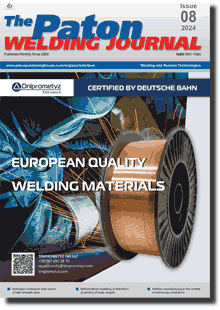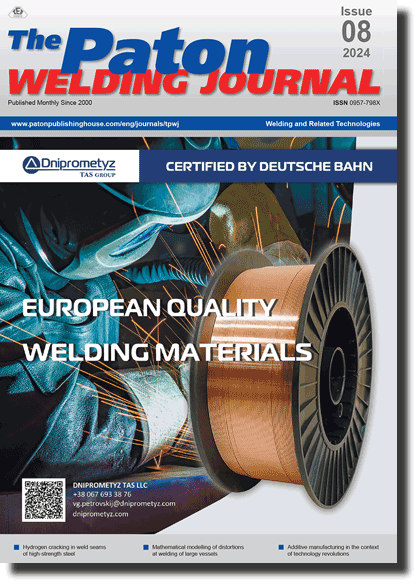| 2024 №08 (05) |
DOI of Article 10.37434/tpwj2024.08.06 |
2024 №08 (01) |

The Paton Welding Journal, 2024, #8, 45-55 pages
Additive manufacturing revolution in the context of technology revolutions
E. Balikci
Bogaziçi University, 34342, Bebek, Istanbul, Turkey. E-mail: ercanbalikci@hotmail.comAbstract
This article positions Additive Manufacturing (AM) within the broader context of historical technological revolutions, recognizing its transformative impact while acknowledging that future generations may perceive it as an early-stage technology. AM has evolved through several industrial revolutions, particularly benefiting from advancements in Artificial Intelligence (AI) and the Internet of Things (IoT). The convergence of traditional manufacturing techniques with these contemporary innovations has created a favorable environment for the widespread adoption of AM technologies. The article emphasizes the need for AM to fully embrace this integration to achieve its potential. The discussion highlights that the core objective of Focused Beam Additive Manufacturing (FBAM) is to control the solidification process, ensuring the production of sound and reliable components on the first attempt. Despite being a multidisciplinary technology, all relevant disciplines converge on achieving a flawless melting and solidification process. This involves precise modulation of energy sources, effective powder management, motion control systems, and temperature/environment regulation, all aimed at producing microstructurally and geometrically flawless components. The article concludes that the success of FBAM depends on the careful orchestration of these multidisciplinary activities, centered around a well-controlled solidification process, to deliver high-quality components that meet business needs.
Keywords:technology revolutions, additive manufacturing, artificial intelligence, Internet of things
Received: 13.06.2024
Received in revised form: 16.07.2024
Accepted: 20.08.2024
References
1. Acemoglu, D., Robinson, J.A. (2012) Why nations fails, currency.7 https://doi.org/10.1142/S22513612138000372. Breiman, L. (2001) Statistical modeling: The two cultures. Statistical Sci., 3, 199-231.
3. Diamond, J. (2017) Guns, germs, and steel - The fate of human societies. W.W Norton and Company.
4. Sarfraz, Z. et al. (2021) Is COVID-19 pushing us to the Fifth Industrial Revolution (Society 5.0). Pak. J. Med. Sci., 37(2), 591-594. https://doi.org/10.12669/pjms.37.2.3387
5. https://en.wikipedia.org/wiki/Nicolas_L%C3%A9onard_Sadi_Carnot
6. https://teslauniverse.com/nikola-tesla/articles/tesla-says-edison-was-empiricist
7. Ciraud, P.A.L. (1971) France Pat. FR2166526A5.
8. https://www.macrotrends.net/global-metrics/countries/WLD/world/manufacturing-output
9. (2023) AMPOWER. https://ampower.eu/reports/
10. ASTM. https://www.astm.org/
11. Montakhab, M., Balikci, E. (2019) Integrated computational alloy design of nickel-base superalloys. Metallurgical and Materials Transact. A, 50, 3330-3342. https://doi.org/10.1007/s11661-019-05252-7
12. https://www.ntop.com/
13. https://www.materialise.com/en
14. https://www.ansys.com/
15. https://www.flow3d.com/
16. https://www.additivemanufacturing.media/articles/freeformbinder-jetting-does-not-change-the-basics-of-manufacturing?utm_content=291921550&utm_medium=social&utm_source=linkedin&hss_channel=lcp-10383111
17. https://amgta.org/
18. Kurz, W., Fisher D.J. (1989) Fundamentals of solidification. Trans. Tech. Publ.
19. Vishwakarma, K. (2007) Microstructural analysis of weld cracking in 718 plus superalloy: Ph.D. Thesis.
20. Mukherjee, T. et al. (2023) Control of grain structure, phases, and defects in additive manufacturing of high-performance metallic components. Progress in Materials Sci., 138, 101153. https://doi.org/10.1016/j.pmatsci.2023.101153
21. Balikci, E., Deal, A., Abbaschian, R. (2004) Antimony-doped germanium single crystals grown from the melt by the axial heat processing (AHP) technique. J. of Crystal Growth, 262(1-4), 581-593. https://doi.org/10.1016/j.jcrysgro.2003.10.074
22. Zavala-Arredondo, M. et al. (2017) Laser diode area melting for high speed additive manufacturing. Materials and Design., 117, 305-315. https://doi.org/10.1016/j.matdes.2016.12.095
23. Roehling, J. et al. (2021) Physics of large-area pulsed laser powder bed fusion. Additive Manufacturing, 46, 102186. https://doi.org/10.1016/j.addma.2021.102186
Suggested Citation
E. Balikci (2024) Additive manufacturing revolution in the context of technology revolutions. The Paton Welding J., 08, 45-55.The cost of subscription/purchase order journals or individual articles
| Journal/Currency | Annual Set | 1 issue printed |
1 issue |
one article |
| TPWJ/USD | 384 $ | 32 $ | 26 $ | 13 $ |
| TPWJ/EUR | 348 € | 29 € | 24 € | 12 € |
| TPWJ/UAH | 7200 UAH | 600 UAH | 600 UAH | 280 UAH |
| AS/UAH | 1800 UAH | 300 UAH | 300 UAH | 150 UAH |
| AS/USD | 192 $ | 32 $ | 26 $ | 13 $ |
| AS/EUR | 180 € | 30 € | 25 € | 12 € |
| SEM/UAH | 1200 UAH | 300 UAH | 300 UAH | 150 UAH |
| SEM/USD | 128 $ | 32 $ | 26 $ | 13 $ |
| SEM/EUR | 120 € | 30 € | 25 € | 12 € |
| TDNK/UAH | 1200 UAH | 300 UAH | 300 UAH | 150 UAH |
| TDNK/USD | 128 $ | 32 $ | 26 $ | 13 $ |
| TDNK/EUR | 120 € | 30 € | 25 € | 15 € |
AS = «Automatic Welding» - 6 issues per year;
TPWJ = «PATON WELDING JOURNAL» - 12 issues per year;
SEM = «Electrometallurgy Today» - 4 issues per year;
TDNK = «Technical Diagnostics and Non-Destructive Testing» - 4 issues per year.


